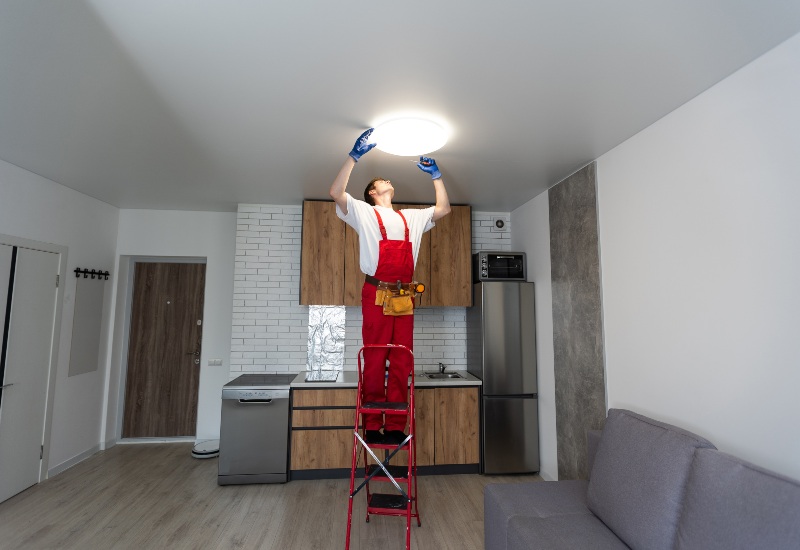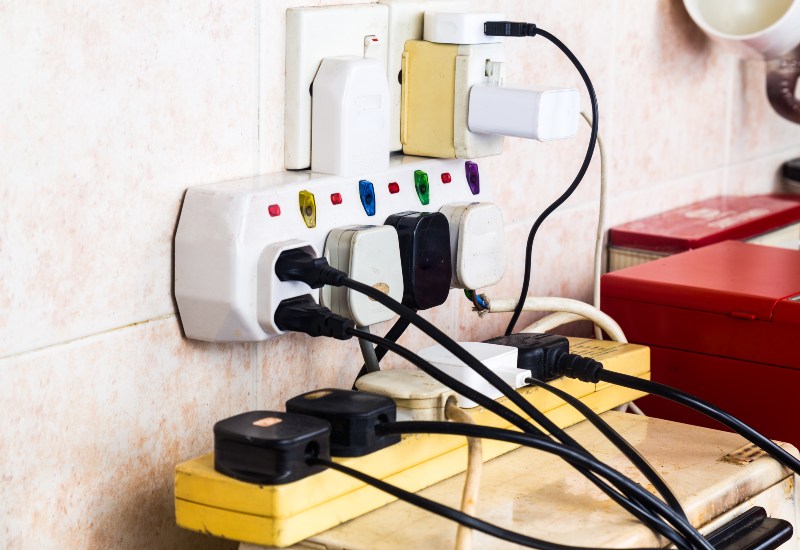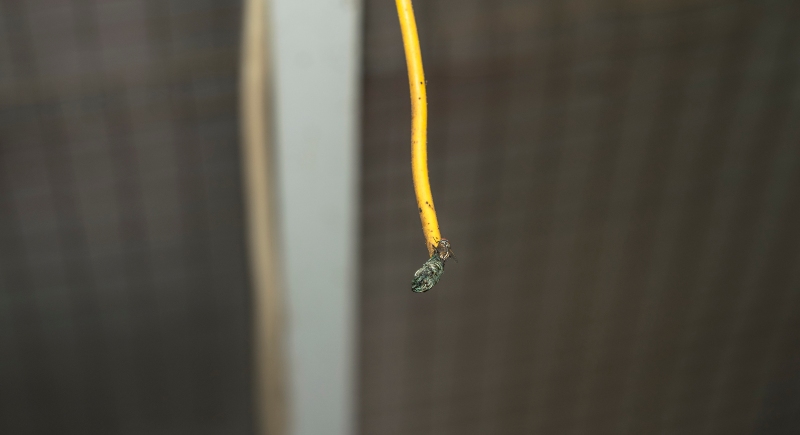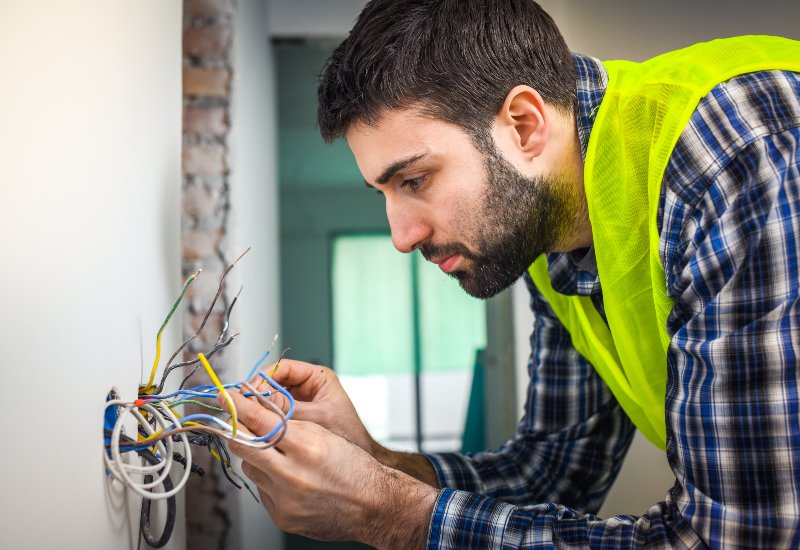-
Reasons You Should Upgrade Your Home’s Lighting
Reasons You Should Upgrade Your Home’s Lighting
Lighting is an essential part of every home. It not only brightens your living spaces but also influences mood, functionality, and the overall aesthetic of your home. Whether you’re considering a simple switch to LED bulbs or a complete overhaul of your fixtures, there are countless benefits to upgrading your home’s lighting. Today we will explore your home lighting, and reasons why you might want to consider home lighting upgrades.
What is Home Lighting?
Home lighting refers to the systems and fixtures that illuminate your home. It’s not just about brightening a space; lighting also sets the ambiance, enhances decor, and ensures safety. With advancements in technology, modern lighting solutions have evolved to include energy-efficient technologies like LED lighting, smart systems, and customizable designs tailored to suit your lifestyle and preferences. Thoughtful lighting design can transform the feel of your home, making it more inviting, functional, and energy efficient.

Complete Guide to Home’s Lighting Upgrades
Upgrading your home’s lighting starts with a thorough evaluation of your current setup and identifying areas where improvements can be made. Begin by assessing each room in your home to determine its specific lighting needs. For example, kitchens and workspaces require bright task lighting, while living rooms and bedrooms often benefit from softer, ambient light. Next, explore energy-efficient options, such as LED light upgrades, which provide long-lasting performance while significantly reducing energy costs. Incorporating smart lighting systems can elevate your home’s functionality, allowing you to control your lighting remotely or set customized schedules and scenes.
Reasons You Should Upgrade Your Home’s Lighting
Upgrading your home’s lighting offers a variety of compelling benefits. One of the most significant reasons is energy efficiency. By replacing traditional incandescent bulbs with LEDs, you can enjoy substantial savings on your energy bills while reducing your environmental footprint. Upgraded lighting also enhances the aesthetic appeal of your home. Modern fixtures and thoughtfully designed lighting plans can breathe new life into your space, making it more attractive and enjoyable.
Functionality is another reason to upgrade. Good lighting improves the usability of every room, whether it’s for cooking, reading, or relaxing. Additionally, upgraded lighting increases the value of your property, making it more appealing to potential buyers. Beyond the practical and financial benefits, improved lighting contributes to a healthier environment by reducing energy waste and using sustainable materials.
Signs You Should Upgrade Your Home Lighting
Sometimes, it’s not just about wanting better lighting—it’s about needing it. Flickering or dimming lights are often signs of outdated or faulty fixtures that should be replaced. High energy bills may indicate that your current lighting is inefficient and costing you more than necessary. Outdated fixtures can also detract from the overall appearance of your home. Poorly lit areas, especially in kitchens, hallways, or outdoor spaces, can limit the functionality and safety of your home. If you’ve been considering a more modern or stylish look for your interiors, upgrading your lighting can be the perfect solution.
Top 5 Reasons to Upgrade the Lighting in Your Home
- Save on Energy Costs: One of the primary benefits of upgrading your lighting is the potential for significant energy savings. Switching to LED lighting can dramatically reduce electricity consumption compared to traditional incandescent bulbs. LEDs not only use less power but also last much longer, which means fewer replacements and lower overall costs.
- Boost Home Appeal: Upgraded lighting fixtures can completely transform the look and feel of your home. Modern designs and thoughtfully placed lights enhance your decor, creating a more polished and inviting atmosphere. Whether it’s a sleek chandelier in the dining room or recessed lighting in the living area, new fixtures add a touch of sophistication to any space.
- Increase Safety: Proper lighting is essential for maintaining safety both indoors and outdoors. Dimly lit areas can increase the risk of accidents, especially in stairways, hallways, or outdoor walkways. Improved lighting also enhances security by illuminating dark corners and entry points, deterring potential intruders.
- Enhance Mood and Productivity: Good lighting has a direct impact on mood and productivity. Bright, natural-like light can improve focus and energy levels, making it easier to work, read, or complete tasks. On the other hand, soft, ambient lighting helps create a relaxing environment, perfect for unwinding after a long day.
- Future-Proof Your Home: Upgrading your lighting is a smart investment in the future. Modern lighting solutions, such as LED systems and smart technologies, align with current energy standards and technological advancements. By adopting these innovations, you ensure your home remains efficient and up to date for years to come.

Steps to a Successful Upgrade
To successfully upgrade your home’s lighting, start with a well-thought-out plan. Identify the areas that need improvement and establish a budget that accounts for both fixtures and installation. Select lighting options that balance style and functionality, ensuring they meet the needs of your home’s design and usage requirements. Consulting with professionals, such as the experienced team at Delta Electric, is highly recommended to ensure that your upgrade is completed safely and efficiently. Once the installation is complete, take the time to test your new lighting to confirm that it meets your expectations and enhances your home as intended.
Schedule an Appointment at Delta Electric Today
Are you ready to upgrade the lighting in your home? Delta Electric in San Jose, CA, specializes in home lighting upgrades and is here to help you every step of the way. Whether you’re looking for home upgrades to light fixtures, LED light upgrades for your home, or an entirely new lighting plan, our skilled team has the expertise to deliver exceptional results. Don’t wait to enjoy the benefits of improved lighting. Contact Delta Electric today. Let us help you light the way to a brighter, more efficient home.
-
Dangers of an Overloaded Circuit
Dangers of an Overloaded Circuit
Have you ever noticed your lights flickering or your circuit breaker tripping unexpectedly? These could be signs of an overloaded circuit, a common but often overlooked issue that can lead to serious problems. At Delta Electric, we’re here to make electrical safety easy to understand and manage. Today we’ll explore what causes overloaded circuits, why they’re dangerous, and how you can keep your home or business running smoothly and safely. With a little knowledge and the right support, protecting your property from electrical hazards is simpler than you think.
What is an Overloaded Circuit?
An overloaded circuit occurs when the electrical demand placed on a circuit exceeds its designed capacity. This happens when too many devices or appliances draw power from the same circuit, causing the wiring to overheat. Overloaded circuits can lead to significant issues, including tripped circuit breakers, damaged wiring, or even electrical fires. Knowing the signs of an overloaded circuit and addressing them promptly can prevent these problems from escalating.

Dangers of an Overloaded Circuit
The dangers associated with overloaded circuits are numerous and potentially severe. One of the most alarming risks is the possibility of electrical fires. When wires overheat due to excessive demand, they can ignite, posing a serious threat to your home or business. Additionally, overloaded circuits can damage sensitive electronics and appliances, often rendering them unusable or requiring costly repairs. Faulty wiring caused by overloading also increases the risk of electrical shocks, which can cause injury. Furthermore, circuit overloads can lead to power outages, leaving parts of your property without electricity and disrupting your daily routine or business operations.
Recognizing the Signs of an Overloaded Circuit
It is important to recognize the warning signs of an overloaded circuit to address the issue before it becomes a major hazard. Some common indicators include flickering or dimming lights, which occur when the circuit struggles to provide consistent power. Circuit breakers that trip frequently or fuses that blow often are another red flag, signaling that the electrical demand is too high for the circuit to handle. Buzzing sounds near outlets or switches, as well as warm or discolored outlets, are additional warning signs. In more severe cases, you may notice a burning smell emanating from electrical outlets or devices, which requires immediate attention.
How to Check for a Circuit Overload
Checking for a circuit overload involves a systematic approach to identifying the problem. Start by locating your electrical panel and identifying the specific circuit breaker that trips frequently. Once you’ve pinpointed the affected circuit, unplug all devices connected to it and take note of their wattage. Compare the total wattage of these devices to the circuit’s capacity, which is typically 15 or 20 amps. If the total wattage exceeds the circuit’s capacity, you’ve identified an overload. To confirm, you can plug devices back in one at a time while monitoring the circuit’s behavior.
Issues Caused by Circuit Overloads
The issues caused by circuit overloads extend beyond immediate inconveniences. Repeated overloading can wear out circuit breakers, reducing their effectiveness and increasing the likelihood of future problems. The excessive heat generated by overloaded circuits can melt or damage the insulation around wiring, creating additional fire hazards. Appliances and electronics connected to an overloaded circuit may also malfunction more frequently, leading to expensive repairs or replacements. These issues underscore the importance of addressing circuit overloads promptly and thoroughly.

How to Prevent Overloaded Circuits
Preventing overloaded circuits is an achievable goal with the right strategies. One of the most effective methods is to distribute electrical loads evenly across circuits, avoiding the use of multiple high-wattage devices on the same outlet or circuit. Having dedicated circuits for major appliances is an important strategy for preventing circuit overload. These kinds of appliances include refrigerators, electric stoves, electric ovens, air conditioners, electric furnaces, washers and dryers, and sump pumps. Upgrading your electrical panel can also help, especially if your property’s electrical system is outdated and unable to meet modern energy demands. Using high-quality surge protectors can manage sudden electrical surges and reduce the risk of overloading. Finally, scheduling regular inspections with a professional electrician ensures that your electrical system remains in good condition and capable of handling your energy needs.
Contact Delta Electric for Overloaded Circuit Solutions
If you’re dealing with an overloaded circuit or have concerns about your electrical system, Delta Electric is here to help. Our team of skilled electricians specializes in diagnosing and resolving issues related to overloaded circuits, ensuring your property remains safe and functional. Whether you’re looking for advice on how to fix an overloaded circuit or need professional intervention to address a persistent problem, we have the expertise to provide effective solutions.
Let’s Keep Your Property Safe!
Don’t let an overloaded circuit jeopardize your safety or disrupt your life. Contact Delta Electric today to learn more about our services. You can fill out our contact form or call us to speak with a member of our professional team. Let us help you maintain a safe and efficient electrical system that meets all your needs.
-
Understanding The Dangers of Improper Electrical Wiring
Understanding Dangers of Improper Electrical Wiring
Electrical wiring powers your lights, climate control, appliances, and devices at your home and business. But while we all enjoy the conveniences that it provides, wiring is often taken for granted. You expect that when you flip a switch or plug into a socket, it will simply work. However, improper electrical wiring can lead to significant risks and costly consequences. Today, we will examine some of the dangers of improper electrical wiring, as well as how to detect and protect against the risks it presents.
What Are Electrical Wiring Issues?
Electrical wiring issues occur when the wiring system in a home or building is improperly installed, maintained, or repaired. These issues can arise from old, worn-out wiring, misconfigured electrical panels, or subpar materials that fail to withstand regular use. When wiring is compromised, it affects not only the efficiency of your electrical system but also its safety.

Understanding Electrical Wiring Issues
Electrical wiring problems often go unnoticed until a serious issue arises. These problems may result from do-it-yourself fixes, unlicensed work, or the natural wear and tear of an aging system. Loose connections, overloaded circuits, and exposed wires may seem minor but can lead to significant risks if not addressed. Recognizing these risks early can help you maintain a safe and functional electrical system.
The Dangers of Improper Electrical Wiring
Improper electrical wiring poses several dangers. One of the most concerning risks is fire. Faulty wiring is a leading cause of house fires, often due to overheating wires or short circuits. Electrical shocks are another serious concern, as they can range from minor discomfort to life-threatening injuries. Wiring issues can also damage appliances and electronics through power surges, leading to costly repairs or replacements. Additionally, inefficient wiring increases energy consumption, which can drive up utility bills unnecessarily.
Common Types of Improper Electrical Wiring Systems
Improper wiring systems manifest in several ways. Older homes may still have knob-and-tube wiring, which is outdated and lacks modern safety features. Aluminum wiring, commonly used in homes built in the 1960s and 1970s, is prone to overheating and poses fire risks. Misconfigured electrical panels that cannot handle the electrical load effectively are another common issue. Unprotected or poorly insulated wires present additional safety hazards, increasing the risk of shocks and fires.
Signs of Improper Electrical Wiring
There are several signs that can indicate problems with your electrical wiring. Frequent circuit breaker trips may suggest an overloaded system or a short circuit. Flickering or dimming lights often point to lose connections or inconsistent voltage. A burning smell near outlets or warm, discolored outlets are clear warnings of overheating wires. Buzzing noises coming from the walls are not normal and may signal arcing or loose wiring. Finally, sparks when plugging in appliances should always be taken seriously and addressed immediately.
Tips for Spotting Improper Electrical Wiring
- Pay attention to circuit breakers. If your circuit breaker trips often, it might mean your electrical system is overloaded or experiencing short circuits.
- Observe your lights. Flickering or dimming lights can be a sign of loose connections or inconsistent voltage levels.
- Notice unusual smells. A burning smell near outlets often indicates overheating wires, which require immediate attention.
- Check your outlets. Warm or discolored outlets could mean the wiring is generating excess heat, a potential fire hazard.
- Listen for unusual sounds. Buzzing noises from walls or outlets may signal arcing or loose wiring.
- Watch for sparks. Sparks when plugging in appliances are a red flag for faulty wiring that needs professional assessment.

What Preventative Measures to Take
Taking preventative measures can go a long way in avoiding the dangers of improper wiring. Always hire a licensed electrician for installations, repairs, and inspections to ensure the work is done correctly. Regular inspections are essential to catch and resolve issues before they escalate. Upgrading outdated wiring systems improves both safety and efficiency. Additionally, avoid overloading circuits by distributing electrical loads evenly throughout your system. Whole home surge protection can also help protect your system.
Schedule an Inspection at Delta Electric Today
If you have concerns about your electrical wiring, now is the time to address them. At Delta Electric, we provide professional inspections and solutions to ensure your system is safe, efficient, and up to code. Whether you’re dealing with an obvious problem or simply want peace of mind, our team is ready to help.
Call Delta Electric
Don’t let the dangers of bad electrical wiring jeopardize your safety and security. Contact Delta Electric today to schedule an inspection or learn more about how we can help address improper electrical wiring. Located in the heart of San Jose, our commercial and residential electrical experts have been serving the community since 1982. Let us help you stay safe and ensure your electrical system is operating at its best.
RECENT POSTS
categories
- Uncategorized
- Delta Electric
- Commercial Electrical
- Residential Electrical
- Electric Circuits
- Dedicated Circuits
- Circuit Breakers
- Electrical Panels
- Electrical Wiring
- Safety Inspections
- copper wires
- Electrician San Jose
- Trained Electricians
- Electrical Services San Jose
- Malfunctioning Electrical Outlets
- Circuit Breaker
- Grounding
- safety
- Flickering Lights
- Arc Fault Breakers
- electrical system
- Aluminum Wiring
- Circuit Interrupters
- House Surge Protection
- Zinsco Panel Warnings
- Wiring Conversion
- GFCI outlet
- professional electrician
- Knob-and-Tube Wiring
- modern home electrical system
- Fuses
- Electric Car Charger
- Electrical Repair
Archives
2025
2024
2023
2018
2017
- December (4)
- November (4)
- October (5)
- September (4)
- August (4)
- July (4)
- June (4)
- May (4)
- April (4)
- March (3)
- February (4)
- January (3)
2016
- December (3)
- November (4)
- October (4)
- September (4)
- August (4)
- July (4)
- June (4)
- May (4)
- April (4)
- March (4)
- February (4)
- January (4)
2015
- December (4)
- November (4)
- October (4)
- September (4)
- August (3)
- July (4)
- June (4)
- May (3)
- April (4)
- March (4)
- February (2)
2014
- December (3)
- November (4)
- October (4)
- September (6)
- August (2)
- July (3)
- May (2)
- April (1)
- March (2)
- February (1)
- January (1)

